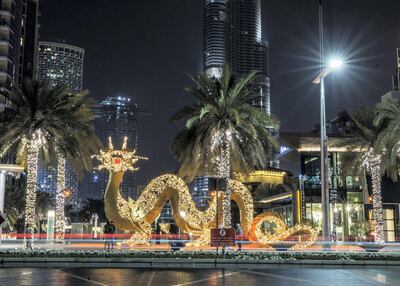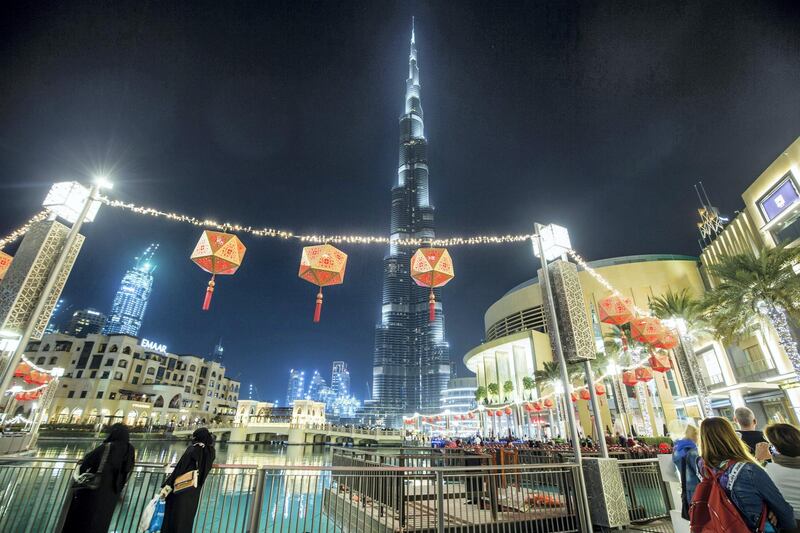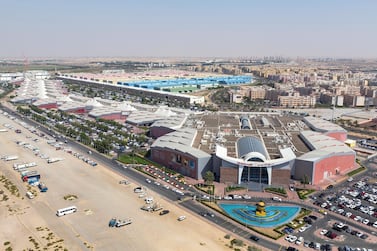The burgeoning Chinese tech industry is looking beyond its shores to imprint its influence in tech, and has now set its sights on the West. The UAE sits at a midpoint as it sweeps across the globe, nearing its goal. But rather than let this global shift pass us by, the Emirates are fast becoming a central partner and collaborator on China’s path to world tech domination.
It’s no secret that China wants to become the world’s leader in tech; for years the country has invested hundreds of billions of dollars in technology such as artificial intelligence and autonomous vehicles, and are now said to be on the cusp of rivalling Silicon Valley in sheer scale.
The UAE for one, has welcomed the potential for collaboration. While 2018 numbers have not yet been released, in 2017, 1.3 million Chinese tourists arrived in the UAE. That’s a 45 per cent increase since 2013, according to data from international consultancy firm Colliers. The country has been quick to act on this rapid increase in Chinese interest. In fact, working with China has become a central pillar of the 50-year charter for Dubai, released by Sheikh Mohammed bin Rashid, Vice President and Ruler of Dubai. Among the nine visions he laid out in January, was a Silk Road that runs through Dubai.
That Silk Road would connect the East and West, and the North and South. “Our next goal is to build our own Silk Road in co-operation with our friendly neighbours who share our vision,” the document says.
It’s an extension of a wider plan that already has its wheels set in motion, with Emirati leaders placing tech at the centre of their post-oil development plans. Sam Blatteis, chief executive of The Mena Catalysts, which advises technology companies on policy and government affairs in the region, says it’s a “key part of the UAE’s long-term strategy, which requires skilled experts, capital, and technology, three resources China has deep reservoirs of.”
“Chinese companies have built a local footprint in all seven emirates, and their government affairs leads are quite adept at clearing the path for them. The country has become the single-largest foreign investor in the Middle East [with investments worth] $29.5 billion (Dh108.33bn) in 2016 and Chinese companies are following in President Xi Jinping’s path of building out global businesses in the UAE, rather than just shipping products from China,” he says.
TikTok and Tech towns: China’s global Silicon Valley
The past few years have seen a rapid pivot of focus on China; one that only seems to be brought into sharp focus when viewed together. In May 2018, Dubai’s Department of Tourism and Commerce Marketing signed an agreement with China’s internet conglomerate Tencent to help promote the emirate as a destination of choice for Chinese tourists. A few months later, China and the UAE signed 13 memorandums of understanding and agreements to boost non-oil bilateral trade by more than 9 per cent to $58bn in 2018 alone.
These developments came after Chinese technology giant Alibaba unveiled its largest tech investment in the Middle East – a $600 million blueprint of a “Tech Town” which would one day house 3,000 firms developing robotics, artificial intelligence, and mobile apps. It’s slated to be five times the size of the Pentagon and built near Dubai’s Jebel Ali port.
“The Chinese tech titans are accelerating at different speeds in the UAE. Those that have chosen to headquarter in the country (Alibaba, Huawei) for the Arab world are well ahead of those that have not: China’s answer to Google, Baidu, for instance, which headquartered in Egypt with about 40 employees at its height – seem to have left the Middle East approximately 18 months ago,” Blatteis says.
Chinese e-commerce websites such as AliExpress and Alibaba have found a foothold in the UAE, with more said to be on their way. Middle Eastern countries such as Saudi Arabia and the UAE largely depend on imports for goods, as manufacturing doesn’t tend to be based in the region.
But perhaps the most incredible of all exemplars of Chinese precence in the UAE is that of video sharing platform TikTok. The app, which launched on New Year’s Eve, quickly stormed the charts. In September, more people downloaded it than Facebook. So what is Tiktok exactly? Well, bear with us here, it’s complicated.
The app allows users to upload brief clips (up to 15 seconds) set to music, often with the creator lip-syncing along. In 2017, Chinese internet company ByteDance, the world’s most valuable start-up at $75bn, bought Musical.ly, the music video-sharing app, for $1bn (Dh3.6bn), merged it with an existing video app, and relaunched it as TikTok.
This led to the Chinese tech giant recently surpassing Uber as the world’s most valuable start-up, due in no small part to its burgeoning role in emerging markets. In the UAE, the app is currently the second-most popular download from the Google Play store and Apple’s App Store, coming in below Whatsapp, according to SimilarWeb. In fact, Chinese apps account for two of the top five downloads in the UAE’s app stores, with file transfer app SHAREit and mobile game PUBG, which is published by Tencent, also featuring across the two stores.
Alibaba Cloud, the cloud computing arm of Chinese e-commerce group Alibaba, opened its first data centre in Dubai in November 2016 and plans to open its second in the coming months. As China’s largest e-commerce company, Alibaba made it onto Fortune’s list of Blue Ribbon companies in 2018; the only Chinese company to make the list of 56 global businesses. A representative for Alibaba declined to comment about the brand’s plans for the Middle East, or about its operations here.

“Chinese companies comprise half of the top 10 e-business companies in the Middle East and have created more than 5,000 jobs in Arab countries. Beijing-backed companies are investing $1bn to build out Abu Dhabi’s Sheikh Khalifa Port,” Blatteis says.
“China’s three largest Internet companies have made 35 overseas deals in the past two years alone, compared with 20 by the top three American internet companies.”
Smartphones and smart investment
The UAE’s smartphone penetration is the highest in the world at 73.8 per cent, with more than 90 per cent of the population having access to the internet. This has laid fertile ground for Chinese smartphone conglomerates to come knocking. Many of them were drawn to the UAE, in particular, for the focus on fifth generation connectivity, which is due to arrive in the UAE this year. Technology analysts estimate 5G connectivity will boost the GCC economy by $269bn over 10 years with cheaper, faster internet access and connecting devices through the Internet of Things.
Huawei, which became the world’s second-largest smartphone manufacturer late last year – behind South Korea’s Samsung, pushing Apple out of the top two for the first time since 2010 – is eyeing an even stronger UAE presence than it has now. David Wang, UAE country manager, says it’s a lucrative market for them, largely due to the tech-savvy population, and a government that focuses on “constantly evolving the digital landscape”.
Huawei’s first Middle East store opened in Dubai in 2013, and was followed by two more over the following years. In 2019, the company is planning on opening six more stores and an e-commerce platform in the UAE.
This comes at a time of widespread concern over the tech giant. It’s currently facing restrictions from several national governments, amid fears its products could be used for spying. But the UAE, for one, isn’t concerned. “We are a very collaborative country, we have worked with everyone from everywhere on earth,” Omar bin Sultan Al Olama, Minister of State for Artificial Intelligence, told CNBC at the Word Economic Forum in Davos last month.

“I believe that every country has something for us to learn from, every country has an angle that we can work with them on. I also believe that there needs to be a continuous global dialogue on how we can leverage technology (and) how we can work together,” he said.
While Huawei’s global market share in Q3 was 14.6 per cent, in the UAE, it seems to have found a stronger consumer base. Here, its market share increased by 30 per cent year-on-year in December alone, Wang says. “The appetite for new technology in the UAE is very evident. Not only by consumers, but also by the government as well as private and public sectors, with initiatives such as Smart Dubai 2021 being a leading example.”
The Mate 20 Pro smartphone, launched in October last year, was sold out well before it even hit shelves – selling 10 ten times more than its predecessor.
Wang says the values of the tech sectors in the UAE and China are also incredibly well aligned. Both countries, for example, are working heavily in the fields of AI, energy, transport, industry and also provide training for small and medium business enterprises to contribute to the economy. Huawei recently partnered with the Hamdan bin Mohammed bin Rashid International Photography Award (HIPA) – the first time it has collaborated with a smartphone brand.
Chinese smartphone brand OPPO is also on a rapid expansion plan across the MENA region, with the UAE as a major target. It’s widely pegged to be one of the first smartphone companies to launch a 5G smartphone, too. Andy Shi, president of OPPO Middle East and Africa says the infrastructure of the UAE, economic policies and a strong talent pool make it an ideal place to do business. “The Gulf region is a particularly exciting market for us given the large youth population, the high level of mobile connectivity, and the public’s enthusiasm for new technology experiences.”
The company is eyeing further expansion in 2019, fresh from opening its second regional hub in the UAE and appointing Dubai as its new centre for operations in the Middle East and North Africa region.
Chinese technology company Xiaomi was once the most valuable start-up in the world and a major player in the smartphone business but has recently been surpassed by the likes of OPPO and Huawei – it has also expanded in the UAE with its second Dubai store.
The intense competition coming from the Far East has left western companies fighting for attention. “Nearly every large Chinese tech company is cementing long-term ties with the UAE tech sector, looking at the Emirates as a hub for finance and technology investments, not simply a customer for ads, marketing and users,” Blatteis says.
"Simply put, China is rewriting the rules on how to rise in influence in the Middle East. Because of the UAE's goliath-sized ports and the country's geographic position almost sandwiched between Saudi Arabia to its West and Iran to its East, the UAE is thinking at-scale too about how to contribute to both Silk Road routes."






